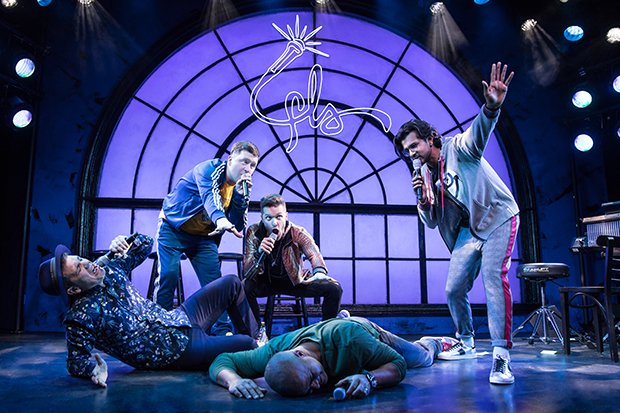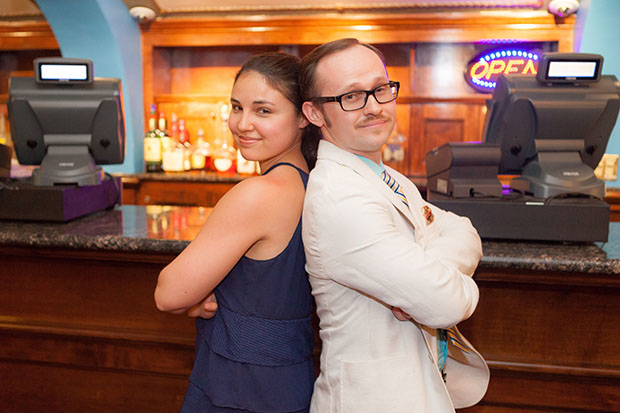Point-Counterpoint: Broadway Bootlegs — Good or Bad?
Two TheaterMania critics debate the practice of recording and viewing illegal videos of Broadway shows.

(© Matthew Murphy)

(© Seth Walters)
Zachary Stewart: We meet again. Hayley, why are bootlegs so bad?
Hayley Levitt: If you participate at all in theater social media, you'll get a good sense of the rage surrounding the bootleg issue. Performers are usually the ones angrily tweeting and Instagramming about them, and I agree on the actors' main points, which usually are: 1) It's distracting to the performers; 2) It's distracting to the audience; 3) It's theft. Somehow it's become socially condoned by Theater Fan Nation, but never forget — it is unequivocally STEALING.
Zach: I think that's an important point to get out of the way: Bootlegs are illegal. Making them is a violation of federal law (17 U.S.C. § 1101). I've never filmed one, and I don't suggest you should either, dear reader. But I also think we should approach this from a realistic perspective. Broadway bootlegs are like abortions: They're going to happen whether they're illegal or not. What we should really be asking is: What contraceptive methods can the theater take to make sure that bootlegs are rarer in the future?
Hayley: To answer that question, we have to look at the reasons people make bootlegs (and justify the making of them) in the first place. More often than not, the arguments in support of bootlegs come back to Broadway's accessibility — or rather, inaccessibility. People will say, "I live in Kentucky and [insert title of show] doesn't tour in my city." Or, "I'm someone who can't afford a Broadway ticket, so bootlegs are my only chance to see a Broadway show." The narrative around them spirals into some pretty heavy debates about classism and social justice. And all because people want to watch The Cher Show on YouTube.
Zach: I'm pretty sensitive to such arguments. I grew up in a Midwestern household that had no money to spare on theater tickets, and I never actually stepped into a Broadway theater until I was an adult. To get my Broadway fix, I had to make do with the Tony Awards and Macy's Thanksgiving Day Parade; but if YouTube had been around when I was a teenager, I would have absolutely consumed every bootleg available to me. Shaming people who do enjoy them feels like shaming people for being poor. Yes, Broadway ticket sales are at an all-time high (as we were reminded several times at the Tony Awards this year), but tickets have also never been more expensive.
Hayley: I can't argue with that. But, as Tony Award winner Stephanie J. Block pointed out in her own Twitter argument on the subject, there are rush policies, lotteries, discount sites (like our own), and off-Broadway theater that's usually more affordable than Broadway and often just as good, if not better. There are affordable ways to access Broadway if you look for them. Not to mention the important fact that something being out of your price range does not give you the right to steal it. If that were the case, I'd have my own ice-cream truck right now.
No. There is amazing theatre happening EVERYWHERE and at all price points, actually. There are discounts sites, there are two for ones, etc… Broadway is a special place and a special experience, but if planned for and saved for, it can be enjoyed. Speaking from my own life. https://t.co/8KFLgYri3I
— Stephanie J. Block (@StephanieJBlock) February 1, 2019
Hayley: So would you feel comfortable telling performers to accept the distracting glare of a cellphone during their show because it's cultivating future ticket buyers?
Zach: No, I wouldn't. I think the Broadway community should adopt the same policy that our judiciary has set around government leaks: If you steal classified documents from the government (or attempt to film a bootleg of Pretty Woman), you should absolutely be prosecuted (or ejected from the Nederlander Theatre). But if you're a person reading those leaks online (or watching a bootleg recording of "You and I"), you're perfectly within your rights as a free person (who happens to have poor taste in musical theater).
Hayley: Fair point. The person surfing YouTube isn't the one committing the crime — it's those maverick Robin Hoods out in the field. Aside from the Yondr pouches we debated last time, maybe the most effective way to stem the tide of bootlegs is online rage from the performers themselves, like Sara Bareilles, who posted an irate monologue on Instagram about someone who recorded her performance of "She Used to Be Mine" in Waitress. I assume the people who record these performances are super fans, so I can't imagine they'd want their heroes throwing daggers at them on social media.
Zach: There's an even better way that doesn't involve social media theatrics: Broadway producers could commit to consistently making and distributing professional recordings of their productions. Opera is way ahead of Broadway in this regard. Every single production in the Metropolitan Opera repertory is available on DVD, professionally shot in HD. Why isn't something similar available at every Broadway merch stand?
Services like BroadwayHD are taking the first steps into the 21st century, but it is by no means a comprehensive archive of even half of what was on Broadway in recent seasons. But I'm willing to bet that if you could watch professional recordings of old Broadway shows with your Netflix subscription, the market for online bootlegs would dry to a trickle.
Hayley: If the number of people I know (including myself) who lived for their professional recordings of Into the Woods and Sunday in the Park With George is any indication, I think that's a solid theory.







